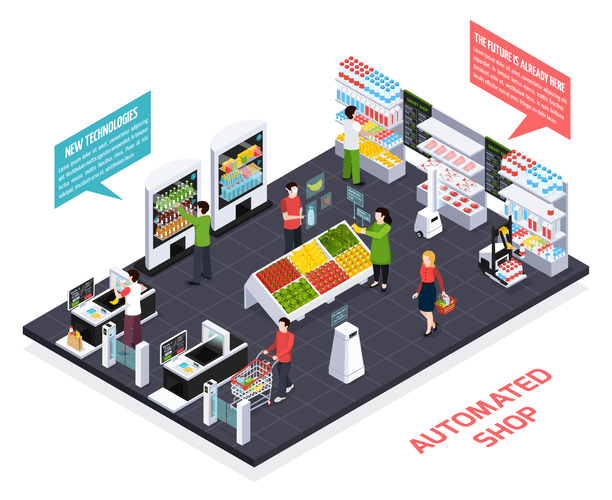Think about your local retail stores. What comes into your mind first? Crowded aisles? Your favorite candy being out of stock? Or long checkout lines? What if we told you, with the implementation of artificial intelligence in retail stores all of these issues can be easily fixed? Details ahead!
We know that retail stores have been working in their traditional ways for a time long now. And the results have been pretty consistent all along. But during the 2019 pandemic, some of the retail industry's major flaws surfaced. The supply chain collapsed within weeks of the demand surge. People were rushing to the checkout lines that were hours long, essential products were out of stock across multiple states, prices were inconsistent, and there were multiple security violations throughout the country.
Although it can’t be said that the use of artificial intelligence in retail market would have completely avoided the situation we faced previously, as it was a once-in-a-century occurrence. We can confidently say that the impact could have been largely alleviated. Now, the use cases of AI are not just limited to these emergency situations. Retail store owners have been using AI-based technologies like machine learning and computer vision to gain important insights that provide them with a competitive edge and help them widely enhance the customer experience. Before we discuss how it can benefit the retail industry let’s take a look at how these AI services can be implemented in retail stores.
Talk to Our AI Experts for Retail Solutions
AI Implementation in the Retail Industry
The retail industry has multiple use cases for the implementation of AI that share a common goal of optimizing the customer experience to increase the overall footfall in the store or on your retail application. (If you don’t have one yet we can help you set one up! Check out our Enterprise Software Development Services)
Okay now, let’s see how AI technologies help retail stores to enhance their services. Although these services are addressed separately, they can work collectively to provide the most optimal solution models for your business needs:

1. NLP
Retailers use natural language processing services to help in the automation of understanding the customer’s feedback about their experience with the business. NLP specializes in transforming human language into a format that can be processed and understood by a computer which is much more efficient. Suppose your business generates large amounts of feedback across multiple platforms. In that case, it may be a wise choice to go for NLP services as analyzing every single review manually can be a time-consuming task. Listening to retail customers’ opinions is important as they directly interact with your business, and can give you some valuable insights about how you can improve your services.

2. Machine Learning
Study the business data to find interesting patterns and anomalies that can help in directly optimizing your business gaps. Artificial intelligence in retail solution models can predict a demand surge with the help of machine learning services. This is based on historical data of every listed product which is evaluated to provide recommendations to restock the products that may rise in demand for the coming business period. Machine learning can also reduce operational costs for your retail stores by automating multiple aspects of the business.

3. Computer Vision
Computer vision-based solutions and other AI technologies can help your business in monitoring products and keeping security in check. Machine learning solutions heavily rely on computer vision services to help with monitoring-based models. Computer vision also provides visual data to deep learning models for analyzing the crowded points within a store. Deep learning can analyze this data to suggest optimal product placement to evenly spread the traffic within your organization. With services like pose estimation and object tracking, the installed CCTVs can detect any suspicious activities within the organization’s premises.
.png)
4. Deep Learning
Deep learning solutions help computers emulate the cognitive processing capability of the human brain, thereby enhancing other artificial intelligence technologies. Technologies like machine learning and multiple other supervised learning algorithms prefer to use structured data for their analysis, deep learning automates these services to help businesses automate the transformation of unstructured data into structured data. Chatbots use deep learning to make themselves appear more realistic and interactive, with every input they receive they further refine their model to perform better every single time.
We got an overview of the use cases and the different technologies powered by artificial intelligence in retail industries. Now let’s observe how AI in retail industry is changing the way people approach regular business problems.

AI in Retail: Services and Use cases
Retail businesses generate and store a lot of daily data in the form of invoices, surveillance, and inventory reports. However, most of this data is just stored to keep a record for calculating profit margins. With the implementation of AI technologies, retail businesses can ensure that this data is analyzed to find valuable insights that can support the enhancement of various retail services. Let’s discuss them in detail.

[a] Inventory Management
Managing inventory can be a cumbersome task for a business of any scale. Keeping track of every single product individually and checking their inventory count every day can be a draining task. The implementation of AI inventory management software for your business can automate the entire process. With the use of technologies like computer vision and machine learning the inventory count can be evaluated every day to calculate what item is low on stock. A demand forecast is published by the AI to the responsible individual for all the low-stock items before the next restocking schedule. Let’s say a customer walked in and bought the majority of the pizza doughs that were in stock for your store. Now with AI installed that information can be instantaneously processed and the requirement for more pizza dough so that the customers looking for it the next day have them restocked.

[b] Predicting Demand Surge
Now some items are more in demand at specific times of the year. For example, turkeys on thanksgiving and decorative ornaments during Christmas. These are some of the obvious examples but when looking at the broader domain of products some of the products are high in demand without any festive reasons. A retail store has to keep these trends in account as well. Machine learning can be helpful in these situations by analyzing inventory trends for multiple previous year records. Finding trends about every product and pointing out the insights that the AI may think are important to address.

[c] Optimize Product Placement
The implementation of AI in retail can help managers decide what product should be placed in which part of the store to optimize sales along with balancing the crowd simultaneously. For example, ever wondered why the grab-and-go candies are placed right next to the check-out station? That’s because category managers are aware that people in the checkout queues spend a lot of time either using their phones or browsing the products on the nearby display shelves. In that scenario, people are more likely to grab one of those snacks to enjoy it on their way out. AI also helps in other ways to optimize product placement, for example, the dairy section is mostly away from the checkout section because dairy is one of the most commonly bought product categories, and keeping it close to the checkout may create a commotion within the store.

[d] Personalized Customer Experience
AI can analyze the buying patterns of your customers to suggest offers and recommendations that may align with your customer’s interests. For example, let's say a customer regularly purchases bread along with peanut butter from your retail store. In a separate analysis, the AI found that people tend to like a separate brand of peanut butter more than one your customer regularly buys. In this scenario, the AI will recommend the customer buy the other brand of peanut butter. Let’s say the customer took the suggestion of trying the new brand and liked it more than the previous one. That will leave a positive impression of your store in the customer’s mind. These predictive analysis models along with advanced CRM models generally use multiple AI technologies like NLP, ML, and deep learning to collectively evaluate the situation before recommending anything for higher success rates.

[e] Reduced Operational Costs of the Store
Advertisements are expensive! Now imagine advertising your retail store's annual meat sale to a vegetarian. As cringe as it may sound this often happens across so many retail stores. When you take a user’s data it’s mostly limited to their name and their phone number. Although there are more valuable insights present in their shopping habits and product preferences, a traditional retail store will not be able to capitalize on this data. The use of AI in retail stores can analyze these customer shopping habits to decide whether an advertisement or a campaign is appropriate for a customer or not. This way you can run ads to only the customers who are more likely to respond in a positive way, compared to aimlessly broadcasting the ads and losing a large amount of money without getting satisfactory benefits out of it.

[f] Enhanced Security Solutions
With the use of computer vision solutions like object tracking and pose estimation integrated into the surveillance services, detecting any unusual behavior within your store can be an automated task. AI can analyze the average time a person spends in a certain aisle, now let’s say an individual is spending way more than the average time in that area. Or if there is something more blatant like picking up a product and keeping it within their clothing items. The AI would notify these activities to your store’s security unit. These detection protocols use the previously mentioned AI technologies like computer vision and machine learning.

[g] Performance Analysis of Staff Members
Performance analysis is an important task for the efficiency of your retail employees. The use of AI in retail organizations can help with this analysis task so that the employees are acknowledged and appraised for their individual efforts every time. Technologies like computer vision can help in tracking employee behavior throughout their working hours, and NLP can interpret any customer feedback for a specific employee. Other IoT equipment can be used to keep track of whether your employee is punctual or if they are mostly late for their shift hours. For a sales-based company, AI can be used to keep track of the number of successful sales the employee made and appraise them accordingly.

[h] Operate in a Contactless Environment
No one likes to wait in the checkout lanes for hours, even self-checkouts can take a long time as some people have a hard time handling the technologies by themselves. With the proper implementation of AI, checking out of a store would become as easy as walking into the store. Many big companies are developing cashier-less technologies where you can just pick up the product and walk out of the store. With multiple AI technologies and IoT installments, these stores can track every movement of every item the customer picks up or puts back on the shelves. As they will walk out of your store the total amount will be automatically debited from their account. Pretty cool right? This will also solve major problems like wasting hours in a queue and products being illegally stolen.

[i] Interactive Shopping Experience for Customers
Now having a contactless environment can be convenient and efficient for customers, but it can become boring pretty quickly. People love to interact with technology to gain new experiences, thus installing interactive IoT equipment that uses AI in retail stores can make the customer experience much more immersive. Install an in-store voice assistant that can analyze a customer’s shopping behavior and compare it to other shoppers with similar demographics to help them narrow down their shopping decisions or other similar services. Use technologies like deep learning to read a customer’s historic data and remind them about a product they might have forgotten. The interactive experience can be continued beyond the store as well, using dynamic e-retail apps to automatically update the purchase history or to run ads based on the customer’s specific shopping habits is made possible with the help of AI.
Industry giants like Lowes. Starbucks, Walgreens, Sephora, TacoBell, and many more have been implementing AI technologies to automate their day-to-day business operations. With our developers’ industry expertise and hands-on experience, we can help you implement a similar AI solution customized to your business needs!
Discuss your Retail Idea with BinaryFolks

Retail-Specific Challenges with the Application of AI
As awesome as it sounds to have access to artificial intelligence in retail market, it still comes with its own set of challenges. Although the benefits a store obtains with the implementation of AI are far greater than the challenges at hand, it is only fair to discuss them briefly so that you have a clear picture of the entire process:
.png)
(i) Expensive to Install
Getting started with artificial intelligence in retail is quite an investment. AI-based models need a good amount of time to design and train to give results that are analogous to a human brain. Training something like a machine learning solution requires a large sum of data. Your company may not have the resources initially to get started with an AI project, but it is not impossible to gather that data in an acceptable amount of time.
.png)
(ii) Legacy Systems
AI services require cutting-edge technology to generate insights fast and to analyze large data sets. However, most retail stores still use legacy systems in their business infrastructure to this day. If your business goals require performing a thorough analysis of all the business data you have accumulated, then upgrading to modern technology will be the right choice.

(iii) Lacks Innovation
As efficient as AI can make your business processes there will always be a need for the human touch, as innovation is one of those domains that hasn’t been explored by AI in retail or any other industry so far. Every single piece of AI technology works around the data they acquire from the people, the capacity to generate absolutely new information out of thin air is something that only a human can do. Thus, AI can without a doubt flesh out every single fact that is available and is relevant to your business, but it cannot provide you with ideas that can help you lead your company.

(iv) Connecting With the Customers
In a retail business, the customer relationship is one of the most effective ways to gain loyal customers, and this is something that only human-to-human interactions can help with. Asking a customer “how has their day been so far?” instead of just generating a bill and sending them off builds a customer-to-business relationship that may be absent in the case of an all-AI-based store system. Thus the loyalty of your customer base in such stores may take a hit if you gain new competitors in the future.

(v) Reliability Issues
AI technologies work with a lot of user data which might not be comfortable information for your privacy-conscious customers. People like to be assured that their data is safe and is not being tossed around for some evaluation process. This may make a large group of people hesitant towards trying out your business’ AI technologies initially. Technical glitches can also affect the reliability of the AI solution, although this scenario is very uncommon with BinaryFolks’ artificial intelligence in retail solutions. (;
.png)
(vi) Limited Training May Create Bias
The quality of training data is very important while developing an AI solution. It is very important to make sure that the data that is being used represents the real-world scenario, what this means is that the data should address all the aspects of a problem. It is very easy for your small-scale or even large company to have a biased data set, and this may lead to the production of a biased AI model which will not be as effective. The main factor you need to keep in mind is that the data set being used has a perfect balance of quality and quantity to return the most accurate AI solution.
Implementing Artificial Intelligence in Retail with BinaryFolks’ Industry-Wide Expertise
Now that you have all the intel to get yourself started with implementing AI in your retail store, let me tell you how BinaryFolks can provide you with the gear and execution of the project!

[1] Perform Predictive Analysis to Leverage Important Business Aspects With BinaryFolks’ AI Services
We provide our clients with modern AI Predictive models that help customers to execute predictive analysis to capitalize on the business data they have. Our developers provide customized predictive analysis solutions to provide services like predicting demand surges to predict inventory needs in the near future. And also services like personalized customer experience to ensure customer loyalty in the long run. Enhance your business’ security systems by implementing AI-based surveillance models that can detect and notify any unconventional activities in your store’s vicinity.

[2] Upgrade Your Legacy Infrastructure to Cutting-Edge AI Technologies
Working with ancient tech may save you some bucks but in the grand scheme of things you are missing out on that big chunk of that juicy revenue that efficiency brings into a business. With BinaryFolks’ state-of-the-art AI technologies, you can capitalize on that efficiency factor and also process your business data simultaneously to find insights that would otherwise be missed on a legacy system.
Our developers will help you transfer your business data from your old unreliable infrastructure to brand-new AI-powered business models that will help you manage and optimize your workflow.

[3] Process Your Customer Feedback Automatically With BinaryFolks’ Advanced AI-based UGC Analysis Models
The retail industry has one of the closest ties to its customer base and analyzing their feedback can provide businesses with direct insights into how they can improve their overall business goals. With BinaryFolks’ UGC analysis model that uses multiple AI technologies like NLP, machine learning, and deep learning your business can evaluate large amounts of user-generated data to understand the needs of your customers from every demographic.
Our developers have designed AI solutions like chatbots and other review analysis models that absorb customer feedback to analyze customer needs and suggest necessary improvements that your business can implement.
Conclusion
The use of artificial intelligence in the retail market has made stores accessible to customers. As a business owner, you now have all the information you need to make your business more engaging. But before you go, let’s scan down the important takeaways real quick!
[i] Modern AI Technologies That can Enhance Your Retail Workflow
With the use of modern AI-based solutions in the retail industry, businesses can enhance their business's scalability and efficiency to greater heights. These technologies automate several aspects of a retail store to provide customers with a streamlined and personalized shopping experience.
- NLP
- Machine Learning
- Computer Vision
- Deep Learning
[ii] Retail Industry-Specific AI Services and Use Cases
AI can help in solving multiple infrastructure-based issues. It can benefit your business by providing a thorough understanding of every customer’s needs and supporting the business’ revenue model at the same time.
- Inventory Management
- Predicting Demand Surge
- Optimizing Product Placement
- Personalized Customer Experience
- Reduced Operational Costs of the Store
- Enhanced Security Solutions
- Performance Analysis of Staff Members
- Operate in a Contactless Environment
[iii] Challenges With Implementing Artificial Intelligence in Retail Solutions
Building an AI solution has a massive impact on your business, but this boost comes at a small price. Although the installation of an AI model might prove to be a small hiccup in your business workflow, the long-term benefits make extra efforts worth it.
- Expensive to Install
- Legacy Systems
- Lacks Innovation
- Connecting with the Customers
- Reliability Issues
- Limited Training May Create Bias
However, overcoming these struggles & bypassing the probable pitfalls has a shortcut too. That is, letting the seasoned AI practitioners guide you on the way to planning the smart makeover for your retail venture!
Avail Complimentary Retail AI Consultation



.png)
.png)